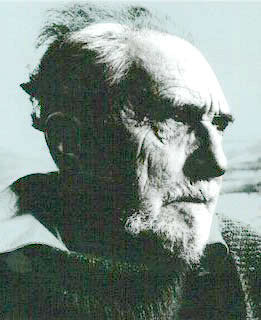Издателство |
| :. Издателство
LiterNet |
Медии |
| :. Електронно списание LiterNet |
| :. Електронно списание БЕЛ |
| :. Културни
новини |
Каталози |
| :. По
дати : Март |
| :. Електронни книги |
| :. Раздели / Рубрики |
| :. Автори |
| :. Критика за авторите |
Книжарници |
| :. Книжен
пазар |
| :. Книгосвят: сравни цени |
Ресурси |
| :. Каталог за култура |
| :. Артзона |
| :. Писмена реч |
За
нас |
| :. Всичко за LiterNet |
EZRA POUND
(1885-1972)
 American
poet and critic, often called "the poet's poet" because of his profound influence
on 20th century writing in English. Pound believed that poetry is the highest
of arts and challenged many of the common views of his time.
American
poet and critic, often called "the poet's poet" because of his profound influence
on 20th century writing in English. Pound believed that poetry is the highest
of arts and challenged many of the common views of his time.
Ezra Pound was born in Hailey, Idaho. He was brought up in Wyncote, Philadelphia, where his father was assistant assayer for the US Mint. He studied languages at the University of Pennsylvania, and befriended there the young William Carlos Williams. From 1903 to 1906 Pound studied Anglo-Saxon and Romance languages at Hamilton College.
In 1908 he traveled widely in Europe, working as a journalist. His first book of poems, "A Lume Spento, appeared in 1908. After its publication Pound settled in London, where he founded with Richard Aldington and others the literary 'Imagism', and edited its first anthology, "Des Imagistes" (1914). The movement was influenced by thoughts of Remy de Gourmont whose book, "The Natural Philosophy of Love" (1904), Pound translated later, and T.E. Hulme, who stressed the importance of fresh language and true perception on nature. In their manifesto the Imagists promised: "1. Direct treatment of the 'thing' whether subject or objective. 2. To use absolutely no word that does not contribute to the presentation. 3. As regarding rhythm: to compose in the sequence of musical phrase, not in sequence of a metronome." Pound's short "one-image poem" 'In a Station of the Metro' is among the most celebrated Imagist works. He soon lost interest in Imagism though, and founded 'Vorticism', which produced a magazine, "Blast".
Pound helped Wyndham Lewis, T.S. Eliot and James Joyce to publish their works. When he worked as W.B. Yeats's secretary, he started a correspondence with Joyce. Pound wrote on Joyce on various magazines, collected money for him, and even sent spare clothes for him. Pound also played crucial role in the cutting of Eliot's "The Waste Land". Eliot dedicated to work to him, as il miglior fabbro (the better maker). In 1914 Pound married the artist Dorothy Shakespear. After a vacation in Egypt, Dorothy conceived in 1926 a child, Omar. In 1922 Pound started his relationship with the violinist Olga Rudge, with whom he had a daughter, born five months before Omar. From this period date one of Pound's most widely read poems, "Homage to Sextus Propertius" (1919).
Pound has been called the 'inventor' of Chinese poetry for our time. Beginning in 1913 with the notebooks of the Orientalist Ernest Fenollosa, he pursued a lifelong study of ancient Chinese texts, and translated among others the writings of Confucius. Pound's translations based on Fenollosa's notes, collected in "Cathay" (1915), are considered among the most beautiful of Pound's writings. Dante and Homer became other sources for inspiration, and especially Dante's journey through the realms have parallels with his examination of individual experiences in the "Cantos".
In 1920 Pound moved to Paris - Britain had become him "an old bitch, gone in the teeth." Four years later her settled in Italy, where he lived over 20 years. He met Mussolini in 1933 and saw in him the long-needed economic and social reformer. In 1945 he was arrested by the U.S. forces - he was still and American citizen - and pronounced insane in a trial. Pound spent 12 years in Washington, D.C., in a hospital for the criminally insane. During this period he received the 1949 Bollingen Prize for his "Pisan Cantos", which concerned his imprisonment at the camp near Pisa. After he was released, he returned to Italy, where he spent his remaining years. Pound died on November 1, 1972 in Venice. According to Katherine Anne Porter, "Pound was one of the most opinionated and unselfish men who ever lived, and he made friends and enemies everywhere by the simple exercise of the classic American constitutional right of free speech."
Pound published over 70 books and translated Japanese plays and Chinese poetry. The "Cantos", a series of poems which he wrote from 1920s throughout his life, are considered among his best works. In the "Cantos" Pound recorded the poet's spiritual quest for transcendence, and intellectual search for worldly wisdom. However, he did not try to imitate classical epic, but had several heroes instead of one, and projected his own self into his characters. His models were Dante's "La Divina Commedia" and Robert Browning's confessional poem "Sordello" (1840). Just as Beatrice guided Dante's pilgrim, so also classical goddesses appear in the Cantos. Pound also presents mythical, historical, and contemporary figures, mirroring the poetry and ideas of the past and present.
"Great literature is simply language charged with meaning to the utmost possible degree." As an essayist Pound wrote mostly about poetry. Among his most influential works are "ABC of Reading" (1934), which is said to have established the modernist poetic technique, and "The Chinese Written Character as a Medium for Poetry" (pub. 1936), compiled from the notes of Ernest Fenollosa.
=============================
© E-publisher LiterNet, 03.10.2009
The Sun Is but a Morning Star. Anthology of American Literature. Edited by Albena
Bakratcheva. Varna: LiterNet, 2008-2010
